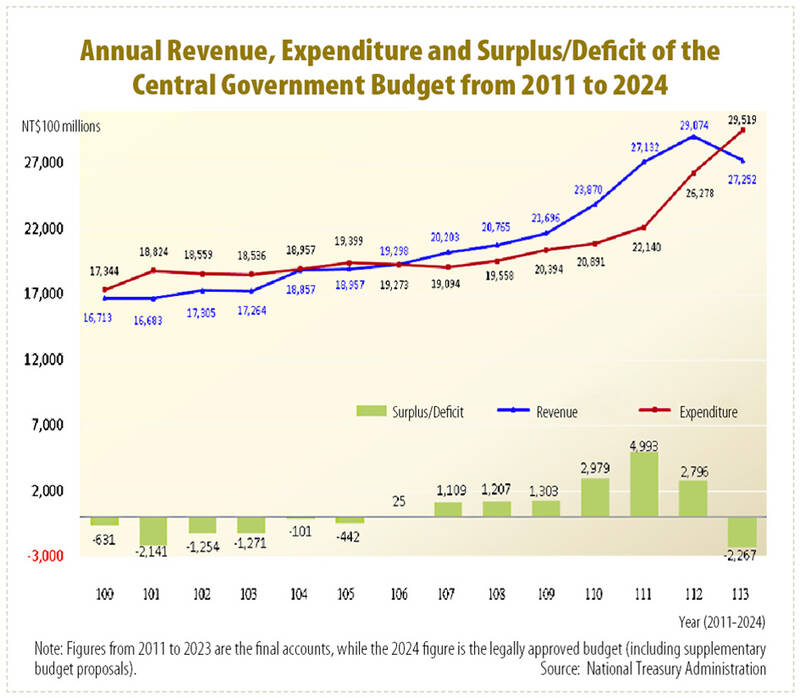Legislators are today and tomorrow to continue deliberating over about 800 budget-related proposals as they aim to finish a review of the central government’s budget before the legislative session ends tomorrow.
Ruling and opposition parties continued to debate the central government’s proposed 2025 budget with total expenditures of more than NT$3.13 trillion (US$95.1 billion).
On Friday, the Chinese Nationalist Party (KMT) and the Taiwan People’s Party (TPP) used their majority in the Legislative Yuan to cut NT$93.98 billion from the central government’s general budget.

The KMT has proposed cutting a total of NT$111 billion, or 3.47 percent, from the budget.
Under the recently amended Act Governing the Allocation of Government Revenues and Expenditures (財政收支劃分法), the central government must allocate NT$375.3 billion annually to local governments, affecting 28 percent of the budget, the Directorate-General of Budget, Accounting and Statistics has said.
If national defense expenditures are not reduced, it would affect 37 percent of the budget, it added.
Democratic Progressive Party (DPP) caucus chief executive Rosalia Wu (吳思瑤) yesterday said that in the 16 years of the administrations of former presidents Ma Ying-jeou (馬英九) and Tsai Ing-wen (蔡英文), the legislature on average cut the central budget by just 1.19 percent, about one-third of the opposition parties’ proposed 3.47 percent cut, the largest to the budget in history.
The opposition has been obstructing the central government from fulfilling its policy commitments and encroaching on the Executive Yuan’s budgetary authority, she said.
“Budget oversight should be rational,” but the opposition’s proposals “are driven by a desire to make governance difficult for the administration,” Wu said.
KMT Secretary-General Justin Huang (黃健庭) said that even with the 3.47 percent budget cut, President William Lai’s (賴清德) administration would still have a budget of NT$2.8 trillion to NT$2.9 trillion.
“This administration is incompetent,” he said, adding that previous administrations operated fine with a budget of about NT$2 trillion.
The central government under the DPP has wasted a significant amount of money and if the legislature did not conduct a thorough review, “we would be failing in our duties,” he said.
TPP Acting Chairman and caucus whip Huang Kuo-chang (黃國昌) on Thursday last week said that his caucus proposed cutting NT$200 billion and freezing NT$100 billion of the budget, accounting for about 10 percent of its total.
The opposition parties are fulfilling their duty by conducting a thorough review of a record-high budget, he said.
Huang Kuo-chang said that pro-DPP media and DPP legislators were spreading disinformation by claiming that legislators from opposition parties want to paralyze the government.
In 2012, Tsai, then-DPP chairperson, wrote on Facebook that government agencies’ budgets should be cut by 20 percent, he said.
“As a former minister, I know the government and ministries could still function with a 10 percent budget cut,” he said Tsai had written.
It is contradictory that Tsai could make such a statement and yet the TPP is being accused of paralyzing the government for its proposed budget cuts, he said.

Chinese Nationalist Party (KMT) Chairman Eric Chu (朱立倫), spokeswoman Yang Chih-yu (楊智伃) and Legislator Hsieh Lung-chieh (謝龍介) would be summoned by police for questioning for leading an illegal assembly on Thursday evening last week, Minister of the Interior Liu Shyh-fang (劉世芳) said today. The three KMT officials led an assembly outside the Taipei City Prosecutors’ Office, a restricted area where public assembly is not allowed, protesting the questioning of several KMT staff and searches of KMT headquarters and offices in a recall petition forgery case. Chu, Yang and Hsieh are all suspected of contravening the Assembly and Parade Act (集會遊行法) by holding

PRAISE: Japanese visitor Takashi Kubota said the Taiwanese temple architecture images showcased in the AI Art Gallery were the most impressive displays he saw Taiwan does not have an official pavilion at the World Expo in Osaka, Japan, because of its diplomatic predicament, but the government-backed Tech World pavilion is drawing interest with its unique recreations of works by Taiwanese artists. The pavilion features an artificial intelligence (AI)-based art gallery showcasing works of famous Taiwanese artists from the Japanese colonial period using innovative technologies. Among its main simulated displays are Eastern gouache paintings by Chen Chin (陳進), Lin Yu-shan (林玉山) and Kuo Hsueh-hu (郭雪湖), who were the three young Taiwanese painters selected for the East Asian Painting exhibition in 1927. Gouache is a water-based

Taiwan would welcome the return of Honduras as a diplomatic ally if its next president decides to make such a move, Minister of Foreign Affairs Lin Chia-lung (林佳龍) said yesterday. “Of course, we would welcome Honduras if they want to restore diplomatic ties with Taiwan after their elections,” Lin said at a meeting of the legislature’s Foreign Affairs and National Defense Committee, when asked to comment on statements made by two of the three Honduran presidential candidates during the presidential campaign in the Central American country. Taiwan is paying close attention to the region as a whole in the wake of a

OFF-TARGET: More than 30,000 participants were expected to take part in the Games next month, but only 6,550 foreign and 19,400 Taiwanese athletes have registered Taipei city councilors yesterday blasted the organizers of next month’s World Masters Games over sudden timetable and venue changes, which they said have caused thousands of participants to back out of the international sporting event, among other organizational issues. They also cited visa delays and political interference by China as reasons many foreign athletes are requesting refunds for the event, to be held from May 17 to 30. Jointly organized by the Taipei and New Taipei City governments, the games have been rocked by numerous controversies since preparations began in 2020. Taipei City Councilor Lin Yen-feng (林延鳳) said yesterday that new measures by